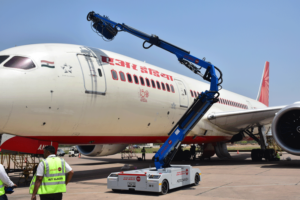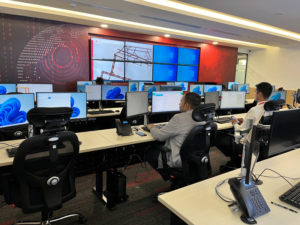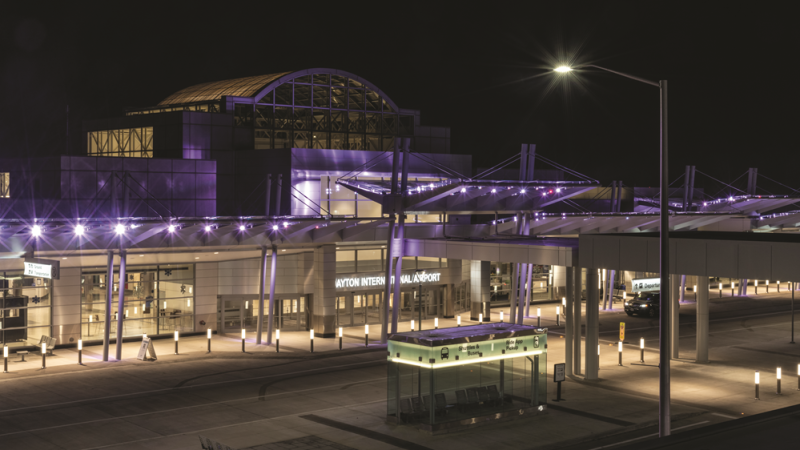Air India SATS Airport Services Private Limited (AISATS) has a vision – a vision to provide world-class airport services in ground and cargo handling that not only meets but exceeds its customers’ expectations. That vision is manifested through the firm’s core values of Excellence, Safety & Security, Creativity, Respect, Integrity, Passion and Teamwork, collectively known as “ESCRIPT”.
The company was established in 2008, as a joint venture whose ownership is split evenly between Air India Limited, a subsidiary of the Tata Group, and one of the world’s leading gateway services and food solutions provider, SATS Limited.
Since then, AISATS has provided exceptional ground handling and cargo handling services to airlines operating in Bengaluru, Delhi, Hyderabad, Trivandrum, Mangalore, Ranchi and Raipur, with plans to expand its footprint to Noida very soon. Its client base includes big names such as Air India, Air Asia, Singapore Airlines, Emirates, Qantas, and many others.
Across these locations, the company handles over 165,000 flights serving more than 35 million passengers with a team of 14,000 employees and a fleet of Ground Support Equipment in excess of 5,000.
It offers a range of hassle-free and comprehensive solutions for passenger handling, ramp handling, baggage handling, check-in services, loading and offloading services, automated exterior cleaning services, cargo handling services and other warehousing-related services.
“We are more than just a ground handling service provider,” says Sanjay Gupta, CEO of Air India SATS. “We are a family of approximately 14,000 value creators spanning eight key locations across India & have plans for international expansion soon.”
Those plans begin with key airports in the Middle East, supported by Air India SATS’s commitment to excellence and world-class cargo handling service capabilities across pharmaceuticals, perishables and machinery.
 Dedication to Innovation
Dedication to Innovation
But speaking to Gupta it is clear that Air India SATS’s vision for the future is not just about geographic expansion. The company has a number of innovative projects in the pipeline, including the launch of a state-of-the-art BLR Logistics Park in Bangalore this September. Then, in November the company will launch India’s first Multi-Modal Cargo Hub (MMCH) at Noida International Airport. This integrated cargo hub, the first of its kind in India, will have a 1.9 million ton capacity Integrated Cargo Terminal, directly connected to a 1.2 million ton capacity Integrated Warehousing & Logistics Zone. This will allow the hub to provide hassle-free cargo handling between road, rail and air transportation.
“At Air India SATS, our approach to innovation rests on four pillars: technology, human touch, excellence and sustainability,” says Gupta. “From cutting-edge solutions like Aerowash, i-Boarding and Centralised Load Control to initiatives like our ‘Take Off With a Smile’ campaign, Delayed Arrival Response Team (DART), and Vihaan.”
Air India SATS has also launched a range of sustainability efforts including solar-powered boarding ramps and green ground service equipment.
“Environmental responsibility is a fundamental value guiding our efforts to minimise the environmental impact of ground and air cargo handling operations,” says Gupta.
The company embraces a multi-pronged approach, prioritising green technology and process optimisation.
“Our eco-conscious initiatives span all operational touchpoints to reduce our carbon footprint and contribute to India’s 2030 de-carbonisation goals,” says Gupta. “We are committed to sustainable practices that not only benefit our airline customers and passengers but also preserve our planet.”
Air India SATS’s innovative approach to ground handling has given it an edge in the aviation industry, and it is currently set to expand its footprint domestically and internationally.
“As a proud Tata Group entity since 2022, we’re aligned with a legacy of excellence and commitment to passenger satisfaction,” says Gupta.
Of course, often that innovation has had to work in response to challenges, most notably the Covid-19 pandemic. Air India SATS swiftly adapted to the pandemic by pivoting its focus from passenger flights to freighter flights, developing specialised Standard Operating Procedures (SOPs) for loading cargo into converted cabins and playing a crucial role in transporting life-saving medical equipment, vaccines, and personal protective equipment (PPEs) across India and the world.
Air India SATS also introduced the country’s first UV-C disinfection service for aircraft interior cleaning, effectively eliminating 99.9% of bacteria, viruses, and germs to ensure the safety of passengers and crew members.
“We’ve harnessed technology to unlock human ingenuity and creativity, streamlining airport operations amidst the multifaceted demands of various stakeholders,” Gupta explains. “These innovations automate labour-intensive tasks, enabling our staff to utilise their time more efficiently. Moreover, artificial intelligence (AI) and Robotics drive automation across our operations, enhancing agility and efficiency.”
These technologies are integral to AISATS’ agile cargo handling processes at facilities such as the MMCH at Noida International Airport and the BLR Logistics Park at Kempegowda International Airport.
Prioritising Talent
AISATS is able to achieve all of this thanks to the investments it makes in its people to equip them to deliver world-class service to clients and passengers. It has recently launched a training academy in Delhi that offers a 30-day Certificate in Ground Handling and Airport Operations with a 100% job guarantee.
“Aviation enthusiasts looking to join the industry can undergo our rigorous training program at our Delhi facility,” says Gupta.
Upon completion, trainees are placed at any of Air India SATS locations to start their journey as ramp-handling agents or customer service executives.
“We believe in investing in our employees from the start, providing comprehensive training to ensure they become our brand ambassadors,” Gupta insists. “We strive to make Air India SATS an employer of choice, which is reflected in our high retention rate. Our commitment to providing a supportive and rewarding work environment ensures that our employees are motivated to grow and succeed within the company.”
 The Next Phase
The Next Phase
When we speak with Gupta, Air India SATS is at a very interesting phase of its growth journey. It is bringing unprecedented solutions to India’s growing aviation and cargo industry while making fast-paced progress expanding its operations within India and across international markets.
“In 2024 alone, we successfully expanded our services to Ranchi and Raipur within India, while also laying the groundwork for our operations in key Middle Eastern markets,” Gupta says. “India’s aviation industry is at an ascending growth phase, set to become the third largest aviation market in the world. We are creating abundant opportunities to further establish our presence and cater to the rising demand.”
The Indian air freight market is projected to reach $17.22 billion by 2028, showcasing a robust 5.65% CAGR. To meet this escalating demand and address the evolving needs of the express delivery sector, Air India SATS is strategically expanding its operations to key regional locations.
“Our Multi-Modal Cargo Hub at Noida’s Jewar airport will be a ground-breaking facility, seamlessly integrating multiple modes of transportation with consolidated ancillary and value-added services,” Gupta says. “This innovative approach will establish an efficient route for cargo throughput across India and beyond. Given the abundant opportunities, our training academy in Delhi is nurturing the future workforce, equipping them with the skills to tackle challenges effortlessly. With these initiatives and investments in place, we are confident of a promising and prosperous future ahead.”







